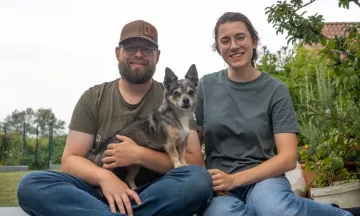Can you socialise an older dog?
It is indeed possible to socialise your older dog, although it takes a bit of extra time and patience.
Ideally, socialisation should happen in the first 12 months of a puppy’s life. This is the critical period for learning behaviours and forming habits. However, don’t panic if you have a dog that missed out when they were young. There is still hope for your older dog!

What is socialisation?
Socialisation refers to teaching a dog to be calm around new people, pets and environments. It’s a really important process for your dog to feel safe in new surroundings. Likewise, it’s a critical part of teaching your dog to behave calmly around others.
It can be a little harder socialising an older dog for the same reason as it can be harder teaching them new tricks. It can take a little more time and patience to change old habits. As such, this is something you may need to take into account if you adopt a rescue pet.
Dogs can become nervous, withdrawn or even aggressive without proper socialisation. Therefore, it’s crucial to invest time in socialisation, whether you own a new puppy or an older rescue.
Having patience, consistency and an open mind are essential to teaching your older dog good social behaviour. Remember: a dog will pick up on your energy, so be sure to keep things nice and relaxed!

5 tips on how to socialise an older dog
- Teach yourself dog body language: You can remove your dog from any stressful or dangerous situations if you know their body language. Dog body language can be very subtle, so take the time to familiarise yourself with it.
- Have visitors in your home: this is a great, safe way to get your dog used to new humans. Start in your home where they are most at ease and allow your dog to make the first move. You might even arm your visitors with a pocket of treats.
- Regular walks: Walks allow your dog to get used to new sights, smells and sounds. Be sure to walk your dog daily and try different parks and pathways. If you can’t take your dog out every day, use a dog walker.
- Meeting new dogs: if your dog is out on a walk, chances are they will encounter other dogs. Be sure to remove your dog from any unsafe situations that provoke aggression. Don’t rush your dog or push them into anything they don’t want to do.
- Training: Managing your dog’s behaviour can be easier with solid obedience training. For example, good recall and walking behaviour can make it easier when introducing your dog to new situations. You might even consider consulting a professional trainer if your dog is particularly nervous when out and about.
- Pet sitter: Get your dog used to new people by having a trusted pet sitter pop over during the day. They can take your dog for a walk or just keep them company when you’re at work. Be sure to meet and greet before agreeing to a booking.






